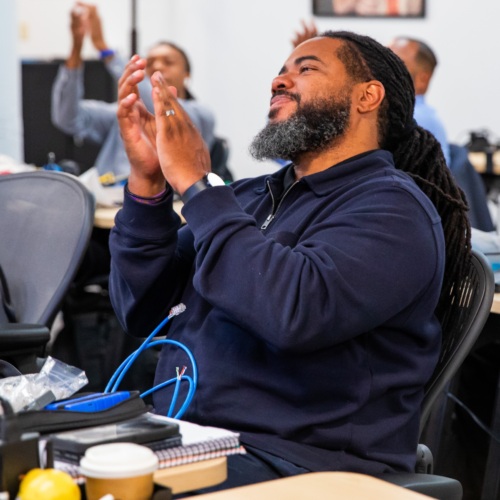
The Power of Apprenticeships: Building Skilled Talent for Today’s Workforce
The US education system and employers alike are currently grappling with significant changes. Traditional degree programs are more expensive than ever and typically require a multi-year commitment. At the same time, there’s a growing skills and experience gap in the workforce. After years of working toward traditional degrees, graduates aren’t prepared to fill the roles that employers critically need to fill.
While colleges and universities do an excellent job of equipping young people with critical thinking and communication skills, that’s insufficient in today’s marketplace. Employers desperately need a new type of worker who has experience with the latest technology and an innate understanding of today’s business world. As a result, the top job openings now typically require six months to a year of experience. That’s a problem for many recent college graduates.
Fortunately, a new approach to education and workforce development is helping build skilled talent for today’s workforce: apprenticeships. Employers are partnering with hands-on learning institutions for innovative apprenticeship programs in industries as diverse as technology, healthcare, and manufacturing. By integrating work experience into education, learning organizations like Per Scholas are closing the skills gap to create a new and ready workforce.
Per Scholas’ Approach to Apprenticeships
Over the past 25 years, Per Scholas has built a reputation for understanding the ever-shifting tech talent market. We have always sought to design unique solutions that benefit our alumni and the employers they go to work for. Historically, we’ve achieved that through placement programs. Over the years, Per Scholas has placed its alumni with more than 850 businesses and organizations. The shift toward apprentice programs, and especially tech apprenticeships, was a natural fit for us.
Look, for example, at our cybersecurity training. Since 2016, we’ve prepared more than 2,000 diverse workers for entry—and mid-level cybersecurity roles. In our job training programs, cybersecurity learners obtain Cisco, CompTIA CSA+, and Splunk certifications and real-world experience within our growing partner network.
One of our first cybersecurity employer partners was Barclays, who quickly realized the power of apprenticeships. In the inaugural Per Scholas-Barclays program, more than 40 Per Scholas learners earned apprenticeships, internships, or full-time jobs with the international financial services organization.
Per Scholas’ approach to apprenticeships works for a few reasons. First is our proven curriculum, which equips apprentices with the skills employers need, especially in the technology and cybersecurity fields. Then there’s our commitment to increasing diversity, equity, and inclusion in tech. Per Scholas alumni are 85% people of color and more than 40% women. Over one-third of the alumni are adults under 30 who are early in their career journeys; two-thirds do not have a four-year degree. By embracing diversity, we bring new talent into the workforce, ready to bridge the gaps that have held employers back.
The Multi-Faceted Benefits of Per Scholas Apprenticeships
Per Scholas apprenticeship programs are so successful because they benefit all stakeholders. For example:
- For apprentices: Practical experience, direct mentorship, and a pathway to a stable career without the financial burden of a traditional four-year degree.
- For employers: Building a talent pipeline, enhancing retention, and cultivating skills that align precisely with organizational goals.
- For communities and the economy: Apprenticeships contribute to local economic development by providing high-quality jobs and increasing earning potential.
Real-World Apprenticeship Success Stories
Barclays may have been among the first Per Scholas apprenticeship partners, but they aren’t the only one with a success story. Nationwide, a Fortune 100 company in the financial services industry, has also seen how our alumni can thrive when given the chance. Nationwide has taken 49 Per Scholas software engineering apprentices. So far, Nationwide has hired more than 80% of them in full-time roles.
Regardless of the partner company, we’ve found that Per Scholas apprenticeships pay off. For every $1 invested in apprenticeships, organizations realize an average ROI of $1,47. [1] Apprentices are paid on a progressive wage scale, making these programs cost-effective, even before any potential tax credits or employment grants that might be available from the state and federal governments.
Why More Industries Should Adopt Apprenticeship Models
The skilled talent shortage continues, but Per Scholas and our apprenticeship programs are quickly bridging the gap. Apprenticeships not only create a new talent pipeline, but they’re also good for local communities and the American economy. With Per Scholas’ commitment to diversity and inclusion, apprenticeships actively improve our learners’ lives and make stronger companies. The numbers even show that apprentices are a great investment.
While we’ve had great success in tech, healthcare, and financial services companies, we believe more industries should adopt apprenticeship models. If this is something your organization can benefit from, we want to hear from you. Contact us today at [email protected] to tell us about your talent needs.
Sign up for our Monthly Impact Report
More News

Donate Now
Your support makes a powerful difference in our ability to build a technology talent training solution that creates greater access and equity.

